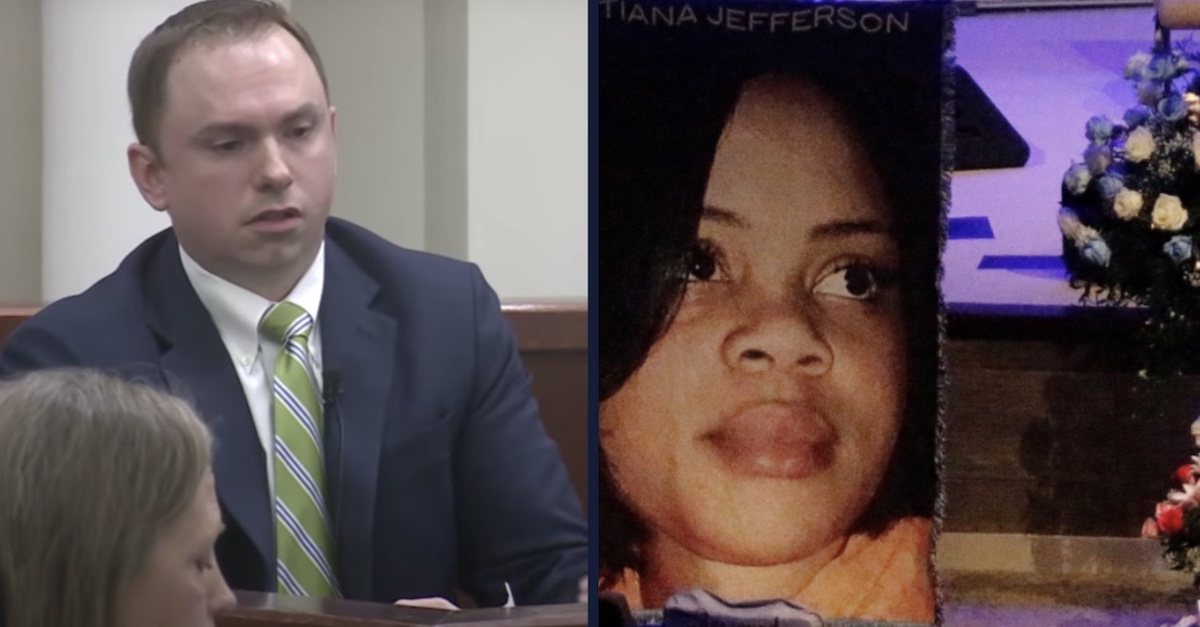One year ago, to the day, former Fort Worth police officer Aaron Dean, 37, went on trial for the death of Atatiana Jefferson, 28. Tarrant County jurors found Dean not guilty of murder but convicted him of manslaughter. He was sentenced to nearly 12 years in prison.
On Tuesday, Dean’s defense team was in court again — offering oral arguments for why his conviction should be overturned.
In downtown Fort Worth, Dean’s attorney Bob Gill said the pretrial media climate made it impossible for his client to receive a fair trial in Tarrant County — and that the courts repeatedly erred when proposed venue changes were denied by two separate judges.
“I don’t remember a time where I saw oral argument in a case make the front page of the Star-Telegram above the fold,” Gill said, according to a courtroom report by the local major daily newspaper, the Fort Worth Star-Telegram, which consistently covered the case.
Dean, who is white, fired the shot that killed Jefferson, who is Black, as she was baby-sitting her then-8-year-old nephew at her mother’s house as they played video games in October 2019. The defendant argued his actions were justified and in self-defense. Prosecutors argued Dean did not act in self-defense and, citing police protocols, that he should have never fired his weapon that night.
“Part of our argument is based on that extensive publicity, and part of our argument is based on the fact that all of that publicity was generated … by a dangerous combination of individuals in Tarrant County,” Gill continued. “Elected officials. High-ranking social officials. Police officials. Many people who all contributed to the narrative in this case that led to Aaron Dean’s conviction.”
The killing scandalized politically conservative Tarrant County.
Then-Fort Worth Police Chief Ed Kraus said there was “no excuse” for the shooting. After initial press conferences made mention of Jefferson’s gun at the scene, Kraus and then-Fort Worth Mayor Betsy Price, a Republican, apologized for highlighting that fact. Price would later say that Jefferson’s gun was irrelevant to the overarching case and described the slain woman as a victim.
Gill argued that those public statements and statements made by then-criminal district attorney, Sharen Wilson, were prejudicial to his client. Wilson, notably, has been criticized by civil rights advocates on numerous occasions — including by Jefferson’s supporters for failing to obtain a murder conviction. They argued that her office did not devote sufficient speed or resources to trying the former officer.
During the trial, prosecutors argued that Dean did not even know Jefferson had a gun on her when he fired the fatal shot. Rather, as body-worn camera footage showed, Dean, who did not identify himself as police, fired within seconds of seeing a silhouette against a window — after he and his partner arrived in response to a nonemergency welfare call about the door of the house being open.
Last week, the Fort Worth City Council approved a $3.5 million settlement for Zion Carr, Jefferson’s nephew, to settle a lawsuit.
In August, Dean’s defense filed a brief that also argued jurors were given an incorrect definition and that they did not have sufficient evidence to consider manslaughter separately from murder. But, on Tuesday, the debate was focused on publicity.
Gill said the various official statements combined to create an atmosphere that “quickly turned this case into a racial matter,” in comments reported by Dallas-based PBS and NPR station KERA.
The state, in response, argued that a large plurality of potential jurors in the case, some 43%, said they had never heard about it — a higher-than-normal amount. On rebuttal, Gill reportedly said that jurors are not always honest. Dean’s attorney said they might have been subconsciously biased against his client due to the press coverage.
At least two members of the Texas 2nd Court of Appeals appeared skeptical of Gill’s conclusion, according to KERA.
“We’re not mind readers,” Justice Brian Walker said.
Have a tip we should know? [email protected]

